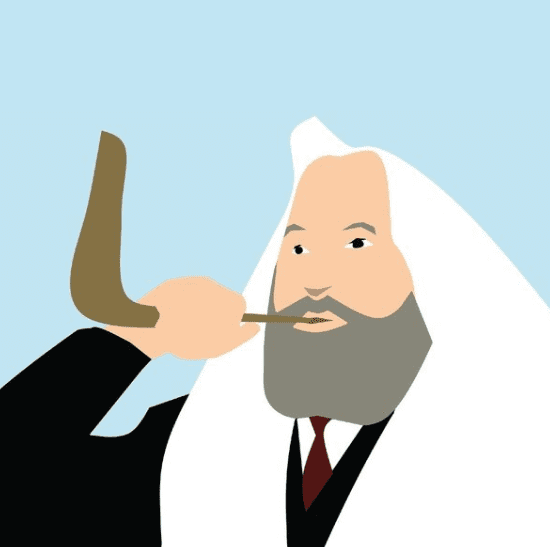In the spirit of atonement: a Yom Kippur message

author: marty grande-sherbert | op-ed editor

Pixabay
Yom Kippur is also called the Day of Atonement
Rabbi Neil Comess-Daniels of Beth Shir Shalom, a Reform synagogue in Santa Monica, California, made headlines when on Rosh HaShanah – the Jewish new year, when we are encouraged to turn our minds to atonement and self-improvement – he publicly called out the transgressions of one of his former students: Stephen Miller, now a key figure in the Trump administration and an advocate of famously harsh immigration policies. To me, about to finish my work for this issue of the Carillon and head into Yom Kippur, Rabbi Comess-Daniels’ actions are the reason for the season, and for anyone unfamiliar with the Jewish high holidays or wondering what connection we have to Miller’s policies, I’d like to elaborate.
Yom Kippur is also called the Day of Atonement – it is a 25-hour fasting period during which one refrains from eating, drinking, bathing and otherwise “afflicts oneself” in favour of praying all day in an act of devotion. Yom Kippur comes at the end of the 10 Days of Awe where Jews are encouraged to make amends with anyone they may have wronged over the last year, and to take steps to improve themselves for the year to come. As Rosh HaShanah begins those contemplative 10 days, it seems Rabbi Comess-Daniels wanted Miller, who studied in his congregation as a child, to consider the influence he had on US immigration policy and be moved to take steps to correct the harm he caused.
As many of us know, Miller’s behaviour has certainly not been pious insofar as the policies he supports – the Trump administration, has constructed a nightmare for refugees and immigrants seeking a life in the States with travel bans and the detaining of undocumented immigrants in prison-like complexes. Comess-Daniels points out that what is most “antithetical to Jewish values” is the separating of children from their families by the U.S. government under Miller’s supervision. In one particularly poignant video that has circulated social media, a young Mexican boy was reunited with his mother after detention and demonstrated disorganized attachment with her; a clear sign that he had been traumatized and could no longer trust the love of an adult. Rabbi Comess-Daniels and I certainly agree that when one considers the need of a child to be connected to their community, and the teaching to love the stranger “as you were once strangers in Egypt,” Miller has a great deal of atonement to do.
I am not just thinking about Stephen Miller before Yom Kippur this year, however, because the injustice that he has allowed is not only happening south of the border. If we are talking about separating families and hurting communities, no one needs to look farther than Canada and its own brand of this same racist heartlessness. It was only 1996 when our country closed its last residential school, and families have been broken apart by that attack on cultural identity, by the post-traumatic stress that followed, and by the resulting separation from Indigenous tradition ever since. The Sixties Scoop, where Indigenous children were placed into foster care away from their communities, was another similar wound. There have certainly been small children and mothers just as torn apart in Canada as that small family from Mexico, and across North America it is clear that racist policies are some of the biggest threats to family togetherness we face.
Why do these issues, concerned seemingly only with government actions, come to my mind when I think about my own personal transgressions? How are Stephen Miller and the Canadian government connected to my personal commitment to justice? The answer is that personal responsibility is, as Rabbi Comess-Daniels demonstrated, not only about being accountable with ourselves but with each other. The actions of Canada represent me, whether or not I agree with them, and if I as a citizen of this country do nothing to speak out and denounce racism, I may as well invite it to continue.
In fact, it is through criticizing the actions of my community that I can further interrogate my own – in Regina now, we have just seen Camp Justice for Our Stolen Children be chased out of Wascana Park where they had operated for almost 200 days as a beacon of community outreach. The camp was about addressing exactly what I have spoken about in this article (the tearing apart of families, the mistreatment of children, the lack of concern for community health), and yet I only found time to visit their site twice this year when they were in need of volunteers. It is not enough for me to merely sit here and criticize; in the future, if I want to improve as a human being, I must put my thoughts and words into action and carve out more time to be where I am needed. In the same way, it is not enough for people like Justin Trudeau to speak on and on about truth and reconciliation in Canada, and yet refuse to put time and money into seriously addressing what that process looks like.
This is only the train of thought that has been most pressing to me this year – for you, there may be other causes or troubling events that have been on your mind, wrongs that you know should be righted by you and others, and I encourage you to take a moment and reflect on them, even if you may not have a whole day of fasting to do so. I think what I appreciate most about Judaism as a whole is that things which are so important to grow as people – in this case, the process of atonement, discipline and self-reflection – are built into the year so that we come around to them and address them without fail. People often criticize religion for “dictating morality.” However, in my experience, faith merely makes the issue of morality more apparent and encourages me to develop mine further. Moreover, we certainly don’t have to be religious or even have an excuse to want to be better people, and while we all may have different traditions, I think the impulse to want to improve should be embraced by us all.
The shofar, a traditional instrument made from a ram’s horn, is blown on Rosh HaShanah and Yom Kippur in religious services. Very loud, it is often compared to a person wailing, and its almost primal sound can serve as a call to action for all of us as we go into another year of what we hope is righteousness. Whatever injustice you may see in the world now, whether that call comes from the shofar or from the depths of your heart, I encourage you to follow it out into the world and take joy in turning your mistakes into new chances for renewal of character.









